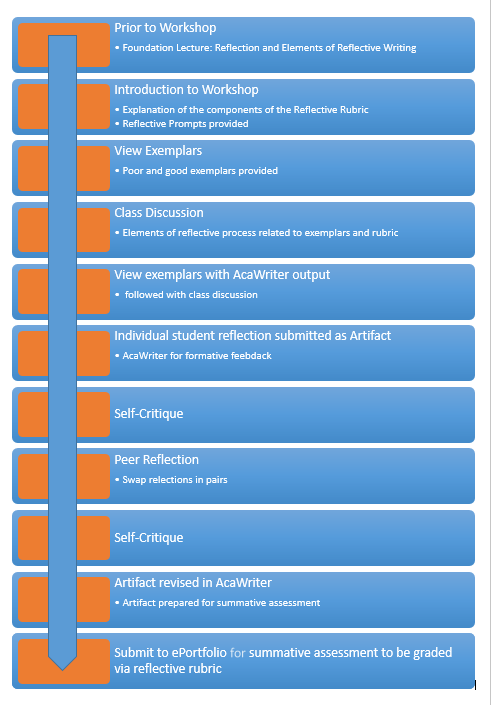Introduction
Introduction
 This Writing Activity with Writing Analytics (WAWA) was developed as part of research conducted by Cherie Lucas (University of Technology Sydney, Graduate School of Health, Discipline of Pharmacy), in collaboration with the Academic Writing Analytics project at the UTS Connected Intelligence Centre.
This Writing Activity with Writing Analytics (WAWA) was developed as part of research conducted by Cherie Lucas (University of Technology Sydney, Graduate School of Health, Discipline of Pharmacy), in collaboration with the Academic Writing Analytics project at the UTS Connected Intelligence Centre.
Reflection is an important skill development and a graduate attribute for most health professions. Pharmacists are expected to reflect on their practice in order to enhance future practice. However, reflection is not an inherent skill. Despite this, research has shown it can be taught through prompts and guides and further developed through peer reflection.
The construct of reflection is scaffolded throughout their 2-year Master of Pharmacy (MPharm) degree at UTS utilising workshops conducted prior to students attending their clinical placements. Students are required to reflect on their practice during and after their clinical placements and write reflective statements for summative assessment.
In 2018 AcaWriter an automated online tool (revised version of Academic Writing Analytics –AWA) was integrated into pharmacy curriculum to enhance self-reflection and provide formative feedback on reflective writing tasks. As part of the scaffolding process, an interactive workshop utilising AcaWriter was conducted to enable students to further develop the skills of self and peer reflection on student reflective writing tasks prior to students submitting their statements via their ePortfolios for grading purposes.
See the Research tab for more details.
Learning Design
Learning Design
Developed by: Cherie Lucas (School of Pharmacy, University of Technology Sydney)
License:![]() Creative Commons BY-SA 4.0
Creative Commons BY-SA 4.0

Analytics Genre Profile
Reflective Writing (Standard)
This describes the Genre module in AcaWriter that has been developed to support this activity.
License:![]() Creative Commons BY-SA 4.0
Creative Commons BY-SA 4.0
Summary: Highlights sentences that appear to show hallmarks of good academic reflective writing.
Developed by: Andrew Gibson, Adam Aitken, Rosalie Goldsmith, Simon Buckingham Shum (University of Technology Sydney), Ágnes Sándor (Naver Labs Europe)
Version: 1.0
Based on: None
Purpose: Highlights sentences that appear to show hallmarks of good reflective writing.
Textual Features: The model of reflective writing is a distillation of scholarship into the teaching of reflective writing (often about professional practice). This analytics draws attention to sentences that appear to demonstrate three key moves, signalled by icons:
![]() Initial thoughts and feelings about a significant experience.
Initial thoughts and feelings about a significant experience.
![]() The challenge of new surprising or unfamiliar ideas, problems or learning experiences
The challenge of new surprising or unfamiliar ideas, problems or learning experiences
![]() How new knowledge can lead to a change
How new knowledge can lead to a change
Four additional features may be signalled by font, in combination with the above:
refers to oneself
expresses emotions and feelings
expresses self-critique
expresses beliefs, learning, or knowledge
Feedback: The Feedback frame annotates the text using the above conventions, as illustrated in the screenshots below, illustrating how different annotations can be shown/hidden:
Research
Research
Project homepage: University of Technology Sydney, Connected Intelligence Centre, Academic Writing Analytics project
Focus: pharmacy case study
Lucas, C., Gibson, A. and Buckingham Shum, S. (In Press). Utilization of a novel online reflective learning tool for immediate formative feedback to assist pharmacy students’ reflective writing skills. American Journal of Pharmaceutical Education. https://doi.org/10.5688/ajpe6800
Focus: the revised model of reflection and its implementation:
Gibson, A., Aitken, A., Sándor, Á., Buckingham Shum, S., Tsingos-Lucas, C. and Knight, S. (2017). Reflective Writing Analytics for Actionable Feedback. Proceedings of LAK17: 7th International Conference on Learning Analytics & Knowledge, March 13-17, 2017, Vancouver, BC, Canada. (ACM Press). DOI: http://dx.doi.org/10.1145/3027385.3027436. [Preprint] [Replay]
Focus: the first design iterations of the reflective parser, leading to the Gibson et al. model
Buckingham Shum, S., Á. Sándor, R. Goldsmith, R. Bass and M. McWilliams (2017). Towards Reflective Writing Analytics: Rationale, Methodology and Preliminary Results. Journal of Learning Analytics, 4, (1), 58–84. http://dx.doi.org/10.18608/jla.2017.41.5